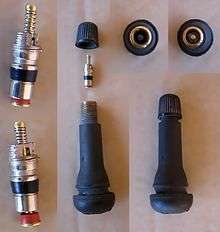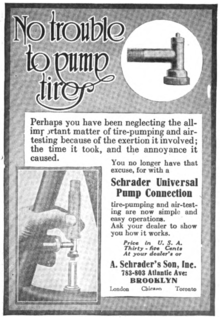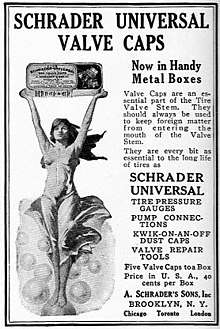Schrader valve
The Schrader valve (also called American valve[1]) is a type of pneumatic tire valve used on virtually every motor vehicle in the world today. The Schrader company, for which it was named, was founded in 1844 by August Schrader. The original Schrader valve design was invented in 1891, and patented in the United States in 1893.[2]

The Schrader valve consists of a valve stem into which a valve core is threaded. The valve core is a poppet valve assisted by a spring. A small rubber seal located on the core keeps the fluid from escaping through the threads. Using the appropriate tools, a faulty valve core can be immediately extracted from the valve stem and replaced with a new one.
Uses
The Schrader valve is used on virtually all automobile tires and motorcycle tires and most wider rimmed bicycle tires. In addition to tube and tubeless tires, Schrader valves of varying diameters are used on many refrigeration and air conditioning systems to allow servicing, including recharging with refrigerant; by plumbers conducting leak-down pressure tests on pipe installations; as a bleeding and test port on the fuel rail of some fuel injected engines; on bicycle air shock absorbers to allow adjustment of air pressure according to the rider's weight; and in the buoyancy compensator (BC) inflators of SCUBA systems where the ability to easily disconnect an air hose (even underwater) without the loss of tank air is critical. Schrader valves are also widely used in high-pressure hydraulic systems on aircraft. Many domestic fire extinguishers use an internal valve identical to a Schrader valve, but with a lever on top to enable quick release of the pressurized content.
Valve


A Schrader valve consists of an externally threaded hollow cylindrical metal tube, typically of nickel plated brass. In the center of the exterior end is a metal pin pointing along the axis of the valve stem; the pin's end is approximately flush with the end of the valve body.
All Schrader valves used on tires have threads and bodies of a single standard size at the exterior end, so caps and tools generally are universal for the valves on all common applications. The core of the valve can be removed or tightened with a tool. Industrial Schrader valves are available in different diameters and valve core variants and are used in refrigeration, propane, and a variety of other uses.[3]
A new development is Schrader valve stems with integrated transmitters for tire pressure monitoring systems (TPMS).
Cap
A valve cap is important on a Schrader valve because if one is not fitted, dirt and water can enter the inside of the valve stem, potentially jamming it or contaminating the sealing surfaces and causing a leak.
Metal, and some hard plastic valve caps have a rubber-washer seal (or a synthetic-rubber-washer seal) inside to help make a hermetic seal. A cap equipped with such a secondary sealing means helps prevent air from escaping from a slightly leaking valve core; substantial valve core leaks, however, may still find their way around the rubber washer. In addition, the rubber washer prevents the cap from loosening and falling off due to vibrations and hence being lost, by acting as a cushion between the cap and the valve stem and in this way damping the vibrations, though most caps are a softer plastic, making the need for a separate seal unnecessary.
Schrader versus other valve types



Whereas Schrader valves are almost universal on car tires, bicycle tubes have Schrader or Presta valves, with most higher end bikes having Presta valves. Both the Schrader and the Presta types are good at sealing high pressures. Their chief differences are that Schrader valves are larger and have springs that close the valve except when the pin is depressed. Schrader valves are used in a wide variety of compressed gas and pressurized liquid applications such as small torch and grill cylinders, and air shocks. Schrader valves are also viewed as more complex (requiring two seals over one), and heavier than Presta valves.
Presta valve stems are 6 mm in diameter, whereas Schrader valve stems for bicycle tires are 8 mm, thus requiring a larger diameter hole in a bicycle rim. While not a concern on wider bike rims, it will weaken a narrow wheel rim, precluding their use on (road) racing bicycles. Another disadvantage of the Schrader is that the air chuck must depress the spring-loaded pin before air can flow during inflation (and potentially introducing debris into the tube or the seal inside the valve), whereas the Presta valve relies on a small knurled nut to keep it shut. Filling up a bicycle tire with a Presta-valved tube at an automobile filling station requires an adaptor, while a Schrader-valved tube does not. Bike riders also need to purchase Presta pumps, or, more commonly, the dual valve capable pumps for both Schrader and Presta valves. Presta valves are also available in a wider variety of stem lengths for aero-bicycle rims. A removable core Presta valve has become common in many applications, specifically tubeless tires where the ability to introduce sealant into the tire through the stem is considered useful.
Dunlop valves (also called "British" or "Woods" valves ) are occasionally used on bicycles in certain countries including India, China, Japan, Korea, Ireland and the Netherlands, but are rarely found in the United States. Dunlop valves are compatible with Presta inflators.
Dimensions
- 8V1 thread: 0.305 in (7.747 mm) x 32 TPI[3] (1⁄32 in or 0.7938 mm pitch) (Tap size: 8v1-32)
- 5V1 thread: 0.209 in (5.309 mm) x 36 TPI (1⁄36 in or 0.7056 mm pitch)(Tap size: 5v1-36)
References
- Tony Atkins and Marcel Escudier (25 April 2013). A Dictionary of Mechanical Engineering. Oxford University Press. p. 312. ISBN 9780199587438. Retrieved 23 October 2013.
- George H.F. Schrader, "Valve," U.S. Patent 0,495,064 (filed: January 9, 1893 ; issued: April 11, 1893).
- "Schrader Valves". www.schraderinternational.com. Archived from the original on 2017-04-26. Retrieved 2017-04-25.
External links
| Wikimedia Commons has media related to Schrader valves. |
- TRA (The Tire and Rim Association, Inc.)
- Schrader-Bridgeport International (North American English version)
- Valve threads